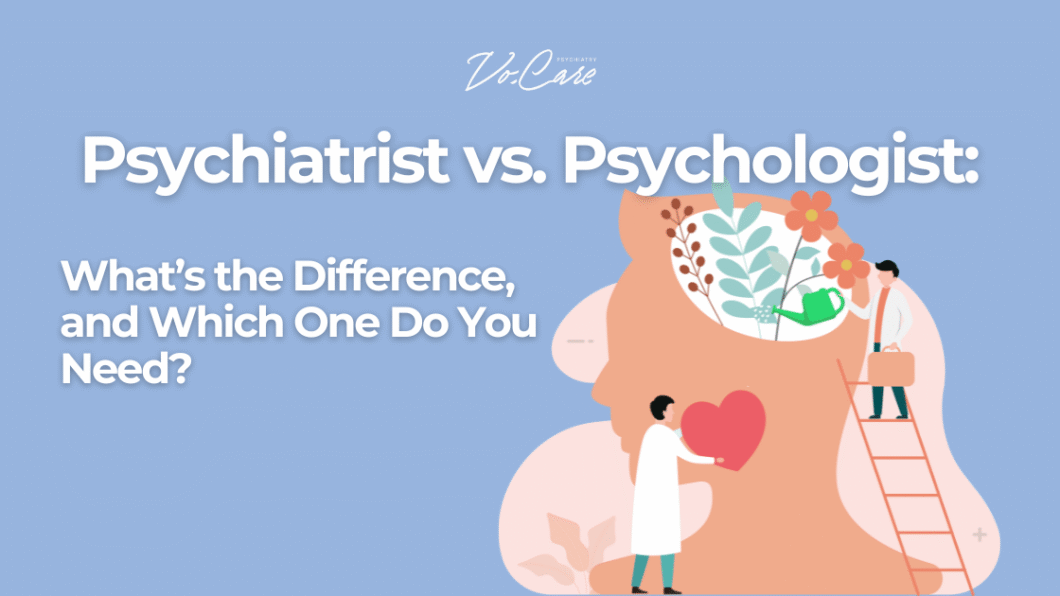TL;DR: Psychiatrist vs. Psychologist: What’s the Difference?
-
Psychiatrists are medical doctors who can diagnose mental health conditions, prescribe medications, and provide therapy.
-
Psychologists are trained in therapy and psychological testing but don’t prescribe medication.
-
See a psychiatrist if your symptoms are affecting your daily life, or if you want a medical evaluation to understand what kind of support might help—including whether medication could be part of your treatment plan.
-
See a psychologist if you want to explore emotions, build coping skills, or work through life challenges in therapy.
If you’re looking for mental health support, you might come across the terms “psychiatrist” and “psychologist” and wonder what the difference is. It’s a common question—and an important one. At Vo.Care, we believe that understanding these roles helps you take the first step toward getting the right kind of care. Both psychiatrists and psychologists support mental well-being, but they do it in different ways.
Psychiatrist vs. Psychologist: Understanding the Basics
Psychiatrists are medical doctors. They attend medical school and receive specialized training in mental health. Because of their medical background, they can diagnose conditions, prescribe medications, and also provide therapy.
Psychologists are mental health professionals with a doctoral degree in psychology. They focus on understanding behavior, thoughts, and emotions, and they are trained to provide talk therapy and psychological assessments. However, they do not prescribe medication.
Both are highly trained. The main difference is that psychiatrists can manage mental health through a medical lens, including prescriptions, while psychologists work through therapy and behavioral tools.
What Each Professional Does
A psychiatrist often steps in when medication may be part of the treatment. For example, if someone is dealing with depression that doesn’t improve with therapy alone, or symptoms that make daily functioning difficult, a psychiatrist can assess, diagnose, and prescribe medication if needed. Some also provide therapy, though many focus on managing medications and monitoring progress.
A psychologist helps people understand their emotions, manage stress, and navigate challenges through structured therapy sessions. They often work with individuals facing anxiety, trauma, grief, relationship issues, or life changes. They also perform psychological testing, which can be helpful for diagnosing learning differences, attention difficulties, and emotional patterns.
Psychiatrist vs. Psychologist: "Who should I see?"
So how do you know who to reach out to first? It depends on what you’re experiencing and what kind of support you think would help most. Some situations call for medical expertise, while others may benefit more from talk therapy. Here’s a simple guide to help you decide.
When to See a Psychiatrist
If you’re dealing with ongoing symptoms that are affecting your sleep, appetite, concentration, mood, or energy levels, a psychiatrist may be the right place to start. Conditions like bipolar disorder, ADHD, and severe anxiety or depression often benefit from medical evaluation and, in some cases, medication.
When to See a Psychologist
If you’re looking for help with managing emotions, building coping skills, or understanding behavior patterns, a psychologist may be the best fit. Psychologists can guide you through therapy approaches like CBT (Cognitive Behavioral Therapy) and help you work through specific concerns without medication.
Working Together for Better Care
Many people benefit from seeing both a psychiatrist and a psychologist—for example, receiving medication management from a psychiatrist and regular talk therapy from a psychologist.
At Vo.Care, Dr. Krysti Vo provides comprehensive care, including medication management, talk therapy, and life coaching. Her work is designed to complement your existing care, not conflict with it. Patients who already have a trusted therapist often find they benefit significantly from incorporating Dr. Vo’s services as well.
Psychiatrist vs. Psychologist: How to Decide What’s Right for You
Start by thinking about what kind of help you need. Are you feeling overwhelmed and want someone to talk to? Are you wondering if medication could make a difference? Do you need an assessment to understand what’s going on? These questions can point you in the right direction.
And if you’re not sure, that’s okay too. The most important thing is reaching out. From there, we can help you decide what support makes the most sense for you.
Understanding the difference between psychiatrists and psychologists can help you make more informed decisions about your mental health. Both play essential roles. Sometimes, the best approach includes both. At Vo.Care, we’re here to guide you—so you don’t have to figure it all out on your own.

